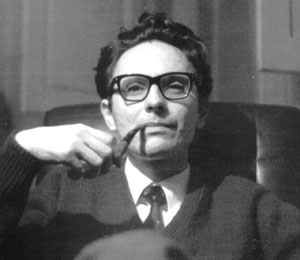Loading AI tools
Italian physician (1933–2017) From Wikipedia, the free encyclopedia
Giorgio Antonucci (24 February 1933 – 18 November 2017) was an Italian physician, known for his questioning of the bases of psychiatry.[1]
Giorgio Antonucci | |
|---|---|
 Antonucci in 1975 | |
| Born | 24 February 1933 |
| Died | (aged 84) Florence, Tuscany, Italy |
| Citizenship | Italian |
| Alma mater | University of Florence, University of Siena |
| Known for | criticism of psychiatry, freedom of thought, non-psychiatric approach to psychological suffering, rejection of the involuntary commitment, rejection of the psychiatric diagnosis |
| Awards | Thomas Szasz Award (2005) |
| Scientific career | |
| Fields | Psychiatry |
| Institutions | Psychiatric hospital Osservanza in Imola (Italy) Psychiatric hospital Luigi Lolli, Imola (Italy) Mental health service in Reggio Emilia (Italy) Centro di Relazioni Umane in Cividale del Friuli (Italy) Psychiatric hospital in Gorizia (Italy) |
| Website | https://giorgioantonucci.org |
Antonucci was born, on 24 February 1933, in Lucca, Tuscany.[2] In 1963 he studied psychoanalysis with Roberto Assagioli, the founder of psychosynthesis, and began to dedicate himself to psychiatry trying to solve the problems of the patients and avoiding hospitalisation and any kind of coercive method (mechanical, pharmacological, psychological). In 1968 he worked in Cividale del Friuli[3] with Edelweiss Cotti, in a ward of the city hospital that had been opened as an alternative to the mental hospitals, called the Centro di Relazioni Umane [Centre for Human Relations].
In 1969 he worked at the psychiatric hospital in Gorizia, directed by Franco Basaglia.[4][5] From 1970 to 1972 he directed the mental health centre of Castelnuovo nei Monti in the province of Reggio Emilia. From 1973 to 1996 he directed worked in Imola on the dismantling of several wards of the psychiatric hospitals Osservanza and Luigi Lolli. During the earthquake that struck Sicily in 1968 he worked as a physician for the Civil Protection Service of Florence. At the time of his death in 2017 Antonucci lived in Florence and collaborated with the Italian branch of the Citizens Commission on Human Rights, with the Centro di Relazioni Umane[6] and with Radicali Italiani.[7]
Dacia Maraini: "Regarding the so-called insane persons, what does this new method entail?"
Giorgio Antonucci: "For me it means that insane persons don't exist and that psychiatry must be completely eliminated."— Interview, 1978[8]
In his writings, Antonucci affirmed that theoretically he is close to the humanistic-existential perspective of Carl Rogers, the approaches focused on the critique of psychiatry (Erving Goffman, R. D. Laing, David Cooper and Thomas Szasz[9]) and the critique of the psychiatric institution of Franco Basaglia.
Szasz affirmed to agree with Antonucci on the concept of "person" of the so-called psychiatric patients: "They are, like us, persons in all respects, that can be judged emotionally and in their "human condition"; "mental illness" does not make the patient "less than a man", and it is not necessary to appeal to a psychiatrist to "give them back humanity""[9]. He is the founder of the non-psychiatric approach[1][10][11] to psychological suffering, that is based on the following propositions:
Antonucci posited that the "essence of psychiatry lies in an ideology of discrimination".[12] He defended a “non-psychiatric thought, which considers psychiatry as an ideology without scientific content, a non-knowledge, whose aim is to annihilate people instead of trying to understand the difficulties of life, both individual and social, in order to defend people, change society and give life to an authentically new culture.”[13]
In the words of Thomas Szasz, "Italian psychiatry has been incalculably enriched by Giorgio Antonucci. It is possible to consider him a good psychiatrist (whatever the meaning of the word): and that is true. It is also possible to consider him a good antipsychiatrist (whatever the meaning of the word): and that is just as certain. I prefer to consider him a respectable person that puts the respect for the so-called insane person above the respect for the profession. For that I send him my regards."[10]
On 26 February 2005 Antonucci received in Los Angeles the Thomas Szasz Humanitarian Award. Szasz said of Antonucci, "His long-standing, courageous, and effective efforts to liberate psychiatric slaves in Italy from their bondage makes him an eminently worthy recipient of CCHR's Thomas Szasz Award."[14]
Seamless Wikipedia browsing. On steroids.
Every time you click a link to Wikipedia, Wiktionary or Wikiquote in your browser's search results, it will show the modern Wikiwand interface.
Wikiwand extension is a five stars, simple, with minimum permission required to keep your browsing private, safe and transparent.